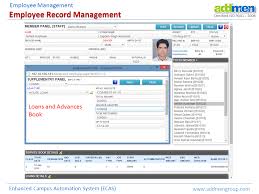
The Importance of Employee Record Management Systems
Employee record management systems play a crucial role in modern organizations by efficiently storing, organizing, and managing essential information about employees. These systems have evolved from manual paper-based processes to sophisticated digital platforms that offer numerous benefits to both employees and employers.
One of the primary advantages of an employee record management system is the centralization of data. By storing all employee information in a secure digital database, organizations can easily access and update records as needed. This centralized approach improves data accuracy, reduces duplication, and ensures compliance with data privacy regulations.
Employee record management systems also enhance efficiency by automating routine HR tasks such as onboarding, performance evaluations, and leave management. By streamlining these processes, organizations can save time and resources while improving overall productivity.
Furthermore, these systems improve data security by implementing access controls and encryption measures to protect sensitive employee information from unauthorized access or breaches. This ensures that confidential data remains secure and only accessible to authorized personnel.
In addition to operational benefits, employee record management systems also support strategic decision-making by providing valuable insights into workforce trends, performance metrics, and compliance requirements. By analyzing this data, organizations can identify areas for improvement, track employee development, and ensure alignment with organizational goals.
In conclusion, employee record management systems are essential tools for modern organizations seeking to streamline HR processes, enhance data security, and leverage workforce data for strategic decision-making. By investing in a robust system tailored to their needs, organizations can create a more efficient, compliant, and productive work environment for their employees.
Understanding and Implementing an Effective Employee Record Management System: Key FAQs
- What is employee record system?
- How do you manage employee records?
- What are 5 essential elements of an effective records management system?
- What is a good records management system?
What is employee record system?
An employee record system is a centralized database or software platform used by organizations to store and manage essential information about their employees. This system typically includes details such as personal information, employment history, performance evaluations, training records, benefits enrollment, and other relevant data. By maintaining accurate and up-to-date employee records, organizations can streamline HR processes, ensure compliance with regulations, track employee development, and make informed decisions regarding workforce management. Overall, an employee record system serves as a comprehensive repository of vital information that helps organizations effectively manage their human resources and support their employees’ professional growth and well-being.
How do you manage employee records?
Managing employee records efficiently is crucial for organizations to ensure compliance, data accuracy, and streamlined HR processes. Employers can manage employee records effectively by implementing a digital employee record management system that centralizes all relevant information in a secure database. This system allows for easy access, updates, and tracking of employee data, including personal details, performance evaluations, training records, and more. By utilizing access controls and encryption measures, organizations can safeguard sensitive information and maintain data security. Automating routine HR tasks such as onboarding, leave management, and performance reviews through the system helps save time and resources while improving overall operational efficiency. By adopting a comprehensive approach to managing employee records through a digital system, organizations can enhance productivity, compliance, and decision-making capabilities.
What are 5 essential elements of an effective records management system?
An effective records management system comprises five essential elements that are crucial for maintaining organized and secure employee records. Firstly, proper categorization and indexing ensure that records are easily searchable and retrievable when needed. Secondly, robust security measures, such as access controls and encryption, safeguard sensitive employee information from unauthorized access or breaches. Thirdly, regular backups and disaster recovery protocols help prevent data loss and ensure business continuity in case of unforeseen events. Fourthly, compliance with data privacy regulations and industry standards is vital to protect employee privacy and maintain legal adherence. Lastly, ongoing training and support for employees on how to use the records management system effectively ensure its optimal utilization across the organization. By incorporating these key elements into their records management practices, organizations can establish a reliable system that promotes efficiency, security, and compliance in managing employee records.
What is a good records management system?
A good records management system is one that effectively centralizes and organizes employee information, ensuring easy access, accurate data maintenance, and compliance with data privacy regulations. It should offer user-friendly interfaces for seamless navigation, robust security features to protect sensitive data, and automation capabilities to streamline HR processes. A good system should also provide comprehensive reporting tools for analyzing workforce trends and performance metrics, enabling organizations to make informed decisions. Ultimately, a good records management system is one that meets the specific needs of an organization, enhances operational efficiency, and supports strategic HR initiatives.
